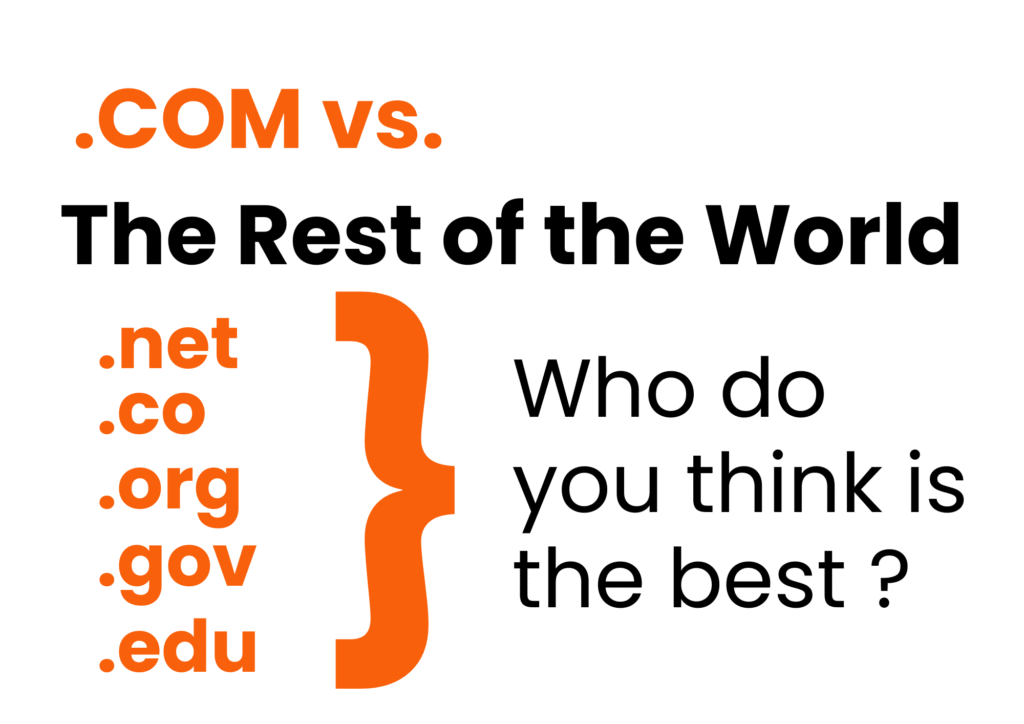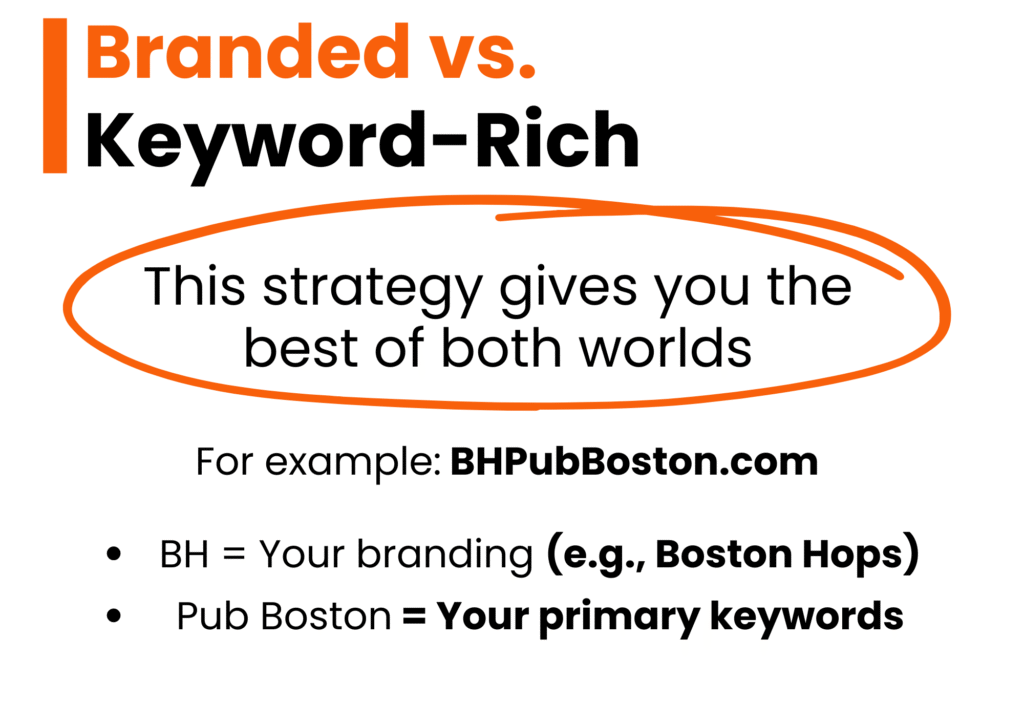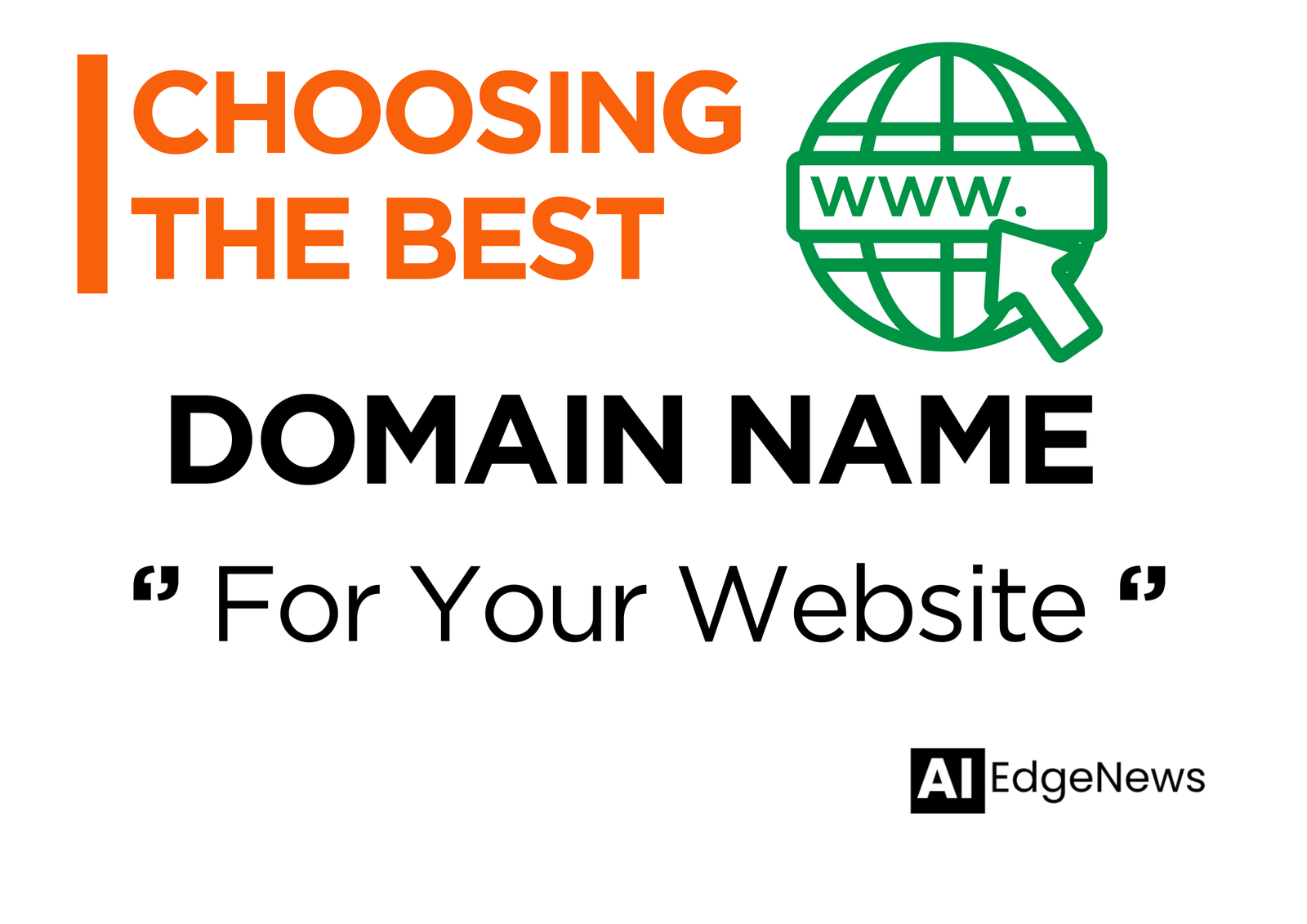Setting up your new business is full of exciting firsts, and one of the most satisfying is choosing your website’s name—also known as your domain name. But before you jump in and make a commitment, it’s crucial to put some thought into it. Believe it or not, the wrong domain name can actually hurt your business.
How to Choose the Best Domain Name (4 Tips )
With so much contradictory information out there, it’s easy to get confused. To cut through the noise, here’s a practical checklist of what to do, what to avoid, and what to prioritize to get your domain name just right.
1. Keep It Short and Memorable
This one might seem obvious, but it’s worth repeating: the longer and more complicated your domain name is, the harder it is for people to remember. Long names are more likely to be jumbled up when typed or shared verbally.

For instance, using the full names of every doctor in a medical practice for your URL is a recipe for disaster (and yes, people actually do this!). The key is to keep it as short as possible while still making it unique and catchy.
2. .COM vs. The Rest of the World
Let’s be honest: the .com domain you really want is probably already taken. It’s tempting to look at alternatives like .net, .design, or other newer, trendier top-level domains (TLDs) like .lawyer or .farm. They can sound specific and cool, but we generally don’t recommend them for one simple reason: habit.

People have a built-in association with .com. If you tell someone to visit “aiedgenews.net,” there’s a very good chance they’ll type in “aiedgenews.com” instead. If your ideal .com isn’t available, try tweaking the name slightly first. If you absolutely can’t find an acceptable .com, your next best bets are .net or .co. Avoid the overly clever extensions—if someone sees “annies.candy.shop,” they’ll likely assume it’s “anniescandyshop.com,” and you’ve just lost a customer.
3. Avoid Hyphens and Double Letters
Steer clear of hyphens for the same reason you should avoid obscure TLDs: they lead to mistakes. If you register a hyphenated name because the .com was taken, users who forget the hyphen will end up on your competitor’s site. Plus, hyphens can often make a domain look spammy or untrustworthy.
Similarly, try to avoid double letters, and definitely avoid triple letters. The trouble often occurs when the last letter of the first word is the same as the first letter of the second word (e.g., “coffeeexplosion.com”). This creates a psychological typing hurdle where people are more likely to make errors. It’s best to sidestep this problem entirely if you can.
4. Branded vs. Keyword-Rich: Find a Happy Medium
This is one of the biggest debates in choosing a domain name. Should you go for something classy and branded, or something loaded with keywords?
Consider this: which feels more like a legitimate business—BostonHops.com or BestPubsInBoston.com? The first one feels branded and established, while the second sounds more like a blog article.
However, a purely branded name can sometimes hold you back in Google search rankings, especially when you’re new and need every advantage. Exact-match domain names that include your target keywords still provide a ranking edge.
So, what’s the solution? We recommend a blended approach: a partial-match domain name. This combines an abbreviated or shortened version of your business name with your top keyword.
For example: BHPubBoston.com
- BH = Your branding (e.g., Boston Hops)
- Pub Boston = Your primary keywords

This strategy gives you the best of both worlds: a unique identity that supports your SEO efforts.
Read More : how to start seo for your new website a step by step guide
Which Domain is Best for an Ecommerce Website?
For an ecommerce website, your domain name needs to be brandable, memorable, and instill trust. The primary goal is to make it easy for customers to find and remember you so they can return directly.
Top Domain Extensions for Ecommerce:
- .com: The undisputed king. It’s the most trusted, recognizable, and easiest for people to remember. If it’s available, .com should always be your first choice.
- .store: A modern, highly descriptive extension that immediately tells visitors you’re selling something. Perfect for new brands wanting to be clear about their purpose (e.g.,
mystuff.store). - .shop: Similar to
.store, it’s short, catchy, and directly related to retail. It’s a great alternative if the.comis taken. - .co: Often used as an abbreviation for “company” or “commerce.” It’s a reputable and popular alternative to
.comthat has gained significant traction.
Key Takeaway: Prioritize .com. If your perfect .com name is unavailable or too expensive, consider .store or .shop as excellent, purpose-driven alternatives.
Read More : how to make an ecommerce website
Which Domain is Best for a Business?
For a general business website (e.g., a service company, agency, or corporation), professionalism and credibility are paramount.
Top Domain Extensions for Business:
- .com: Again, the gold standard. It conveys stability, legitimacy, and is a default expectation for many users.
- .co: Stands for “company” and is a strong, globally recognized contender for businesses that can’t secure the
.com. - .io: Extremely popular with tech startups, SaaS companies, and ventures in the tech world. While originally the country code for the British Indian Ocean Territory, it’s now universally associated with technology (I/O stands for Input/Output).
- .net: Originally intended for network infrastructure companies, it’s now a well-established general-purpose extension. It’s a solid second choice if
.comis taken. - .org: Traditionally for non-profits and organizations. If you are a non-profit, this extension adds instant credibility and aligns with your mission.
Key Takeaway: For maximum trust and authority, secure a .com domain. Tech-focused businesses can successfully leverage .io, while .co offers a modern and professional fallback.
Read More : how to choose a domain name for your online business
Good Domain Name Examples (And Why They Work)
Analyzing successful domain names reveals a clear pattern. They often follow a few proven formulas:
1. Brandable & Unique:
- Google.com: A invented word that is now synonymous with search. It’s short, catchy, and unique.
- Spotify.com: Another invented name that is easy to say and remember. It doesn’t describe the service but has become a powerful brand.
- Etsy.com: A unique name that stands out and avoids any direct association with other words, making it highly trademarkable.
2. Descriptive & Clear:
- Booking.com: Leaves no doubt about what the website does. It’s a keyword-rich name that is incredibly effective for SEO and user understanding.
- TheHomeDepot.com: Clearly describes the brand’s niche (home improvement) while incorporating the brand name.
- Chewy.com (pet supplies): An adjective that evokes a feeling and is highly memorable, while still being simple.
3. Short & Punchy:
- Amazon.com: Named after the massive river, implying vast size and selection.
- Zoom.us: Short, action-oriented, and perfectly describes the service (video conferencing).
- Slack.com: Short, memorable, and the name hints at its purpose (reducing “slack” or inefficiency in communication).
Key Takeaway: The best names are either completely unique and brandable or clearly descriptive of what you do. Aim for short, easy to spell, and easy to pronounce.
Final Checklist Before You Register:
- Is it easy to spell and pronounce? Avoid hyphens and numbers.
- Is it short? Aim for less than 15 characters.
- Is it trademarked? Do a quick search to avoid legal issues.
- Are the social media handles available? Secure your name across major platforms.
- Does it sound good? Say it out loud. Does it sound like a legitimate business?
Your domain name is a long-term investment. Taking the time to choose wisely will pay dividends for years to come in building a strong and recognizable online presence.
Choosing your domain name is a big first step. Once you’ve got yours locked in, you’re ready to build the website that goes with it.







One response to “Choosing The Best Domain Name For Your Website”
[…] Read More : choosing the best domain name for your website […]